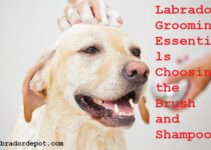Are you concerned about the health of your Labrador Retriever? Have you noticed any unusual symptoms that may indicate a problem?
Our guide to common Labradors Retrievers health issues will help you keep your pup healthy and happy. Read on to discover tips and tricks for managing common diseases and illnesses so that you can ensure a long, healthy life for your furry friend.
Labrador Retrievers are one of the most popular breeds of dogs in the United States – and for good reason. They are friendly, intelligent, and loyal companions that make great family pets. Despite their overall good health, Labradors can develop certain health issues that owners should be aware of.
This guide provides information about common health issues seen in Labrador Retrievers and offers tips on how to keep your Lab healthy and happy. We will discuss topics such as Labrador Retriever anatomy and physiology, genetic disorders, common behavior problems, diet and lifestyle recommendations—as well as preventive care measures. With this comprehensive guide in hand you’ll know exactly what your Labrador needs to maintain optimal health throughout his life!
Common Health Issues in Labrador Retrievers
It is important to understand and be aware of common health issues amongst Labrador Retrievers to ensure that proper preventative measures are taken and any issues that arise can be caught as early as possible. The most common health risks for Labrador Retrievers include orthopedic problems, cancers, vision concerns, hearing loss, skin allergies, and gastrointestinal disturbances.
Orthopedic Problems: Orthopedic problems such as hip dysplasia (malformation of the hip joint) and osteoarthritis are commonly seen in older Labradors and can lead to severe pain or lameness if left untreated. Regular exercise, healthy eating habits and weight maintenance are important for the long-term health of Labrador’s skeleton. It is also recommended that Labradors receive an OFA (Orthopedic Foundation of America) evaluation at least once in their life.
Cancers: Cancers including lymphoma, mast cell tumors and hemangiosarcoma (a type of tumor affecting blood vessels) account for many deaths in Labradors each year. While it is impossible to prevent cancer in dogs, owners should be particularly diligent in looking out for regular check-ups with a vet to detect any suspicious lumps or changes in behavior which could indicate a growing tumor or mass inside the body. Some studies have suggested a link between neutering earlier than 1 year of age and increased risk for some cancers so timing is important for those considering this procedure on their Labradors.
Vision Concerns: Progressive retinal atrophy (PRA), cataracts and glaucoma are all conditions that may affect Labrador Retrievers at one point or another during their lifetime so it is important that yearly eye exams are scheduled with an ophthalmologist veterinarian who can detect any problems early on before they become more serious.
Hearing Loss: Hearing loss due to age related reasons is quite common amongst older Labrador Retrievers but owners should watch out for signs such as not responding to commands or increased scratching at the ears due possible ear infections which may contribute to or cause this condition even in younger individuals. Taking care with any ear drops prescribed by your veterinarian will help keep Labradors ears healthy throughout their lives.
Skin Allergies: Allergies may be seasonal or year-round depending on the dog’s sensitivity level but some easy steps you can take include providing adequate nutrition with fatty acids like omega 3s which reduce inflammation associated with skin allergies as well as giving baths with hypoallergenic shampoos formulated specifically for sensitive skin when necessary.
Gastrointestinal Disturbances: Gastrointestinal disturbances such as diarrhea and vomiting may occur occasionally but if excessive should always be reported right away to your veterinarian who can provide further testing if needed.
Hip Dysplasia
Hip Dysplasia is one of the most common health issues in Labrador Retrievers. It is an inherited disorder affecting the hip joints and results from abnormal hip joint laxity due to a mismatch between the thigh bone and hip joint. It’s a confusing term because it’s far more complex than just “bad hips.” X-rays are needed to confirm a diagnosis.
The main symptoms include stiffness, limping, decreased range of motion, reluctance to exercise and pain (some cases may have no clinical signs). Unfortunately, these signs may not manifest until the condition is well advanced, making it hard to detect in young dogs. If left untreated further damage is likely and can affect quality of life in later years.
There are several potential treatments available that depend on the severity of dysplasia as well as treatments you can use at home to help relieve discomfort and increase mobility. Dietary supplements appear to be most effective if used in conjunction with strict exercise management during times when dysplasia is causing pain or instability.
Definition
The Labrador Retriever is one of the world’s most popular dog breeds. Labradors are known for their intelligence and friendly disposition, making them a wonderful family pet. However, just like other breeds of dogs, Labradors can be prone to certain health issues. It is important for owners to be aware of these potential health issues in order to ensure their Labradors remain healthy and happy.
To give a basic overview, Labradors can suffer from a variety of physical ailments and conditions which vary in severity. Some may only require minimal treatment while others may require more serious medical intervention. Common health issues found in Labradors include hip dysplasia, eye diseases, hypothyroidism, elbow dysplasia and various skin ailments (including allergies). Furthermore, Labradors have an increased risk of obesity due to their higher than average appetite levels.
Therefore it is important for Labrador owners to be familiar with all of the common health issues associated with the breed so as to help minimize any potential problems that may arise during their lifetime. In addition to being aware of Genetic Health Problems such as hip dysplasia and eye diseases, Owners must also make sure that their Lab receives adequate exercise and nutrition in order maintain its healthy weight level so that it does not develop any secondary medical problems related to weight gain such as arthritis or lameness Issues due to excess strain on joints from carrying around excess weight. Furthermore proper veterinary care should also be taken into consideration when it comes time select an appropriate diet as certain types foods may increase the chances developing certain conditions or aggravate existing ones. Following these steps will help ensure that ownership experience with your Labrador will be both enjoyable and rewarding!
Causes
Various factors can potentially lead to health issues in Labrador Retrievers. Inherited diseases may be present at birth or develop throughout the dog’s life. Additionally, lifestyle factors such as exercise, diet and preventive care may also play a role in the development of Labrador Retriever health issues.
Inherited Conditions – Labradors are particularly prone to Orthopedic Disease, which can cause arthritis and joint pain. This is caused by an inherited deformation in the hip or elbow joints, or incorrect bone structure or positioning. Labradors can also be prone to cardiovascular disease (heart problems) and some neurologic illnesses such as epilepsy or seizures.
Environmental Factors – Poor diet is one of the leading causes of ill health in Labradors. An unbalanced diet could predispose Labradors even further to specific diseases due to their breed-specific predilections for certain types of disorders. Additionally, indoors Vs outdoors living situations as well as exposure to toxins like pesticide and smoke might exacerbate pre-existing conditions even further if not managed properly by a qualified veterinarian specialist team.
Exercise Needs – Like any athletic dog breed, Labrador Retrievers may require more exercise than other breeds depending on their lifestyle needs that should be discussed with a Vet specializing in animal behavior and nutrition including tracking your dog’s caloric needs according their size and individual activity level objectives.
Obesity
Obesity is one of the most common health issues seen in Labrador retrievers, particularly when they are overfed energy-dense food or allowed too many treats. Overweight Labradors have an increased risk of developing health problems such as diabetes and joint diseases. As with humans, obesity increases risk of cancer and other life-threatening diseases.
It’s important to recognize the symptoms of obesity in your Lab and take measures to prevent it by providing a nutritionally complete diet that provides necessary nutrients in appropriate amounts, limiting treats, and ensuring regular physical activity.
It is also important to monitor body condition score (BCS) on a regular basis as part of overall well being assessment for your Labrador. A BCS above 5 (range 0-9 scale) for females, 6 for males is considered overweight or obese. To obtain an accurate BCS measurement, you should consult with your veterinarian who will use set criteria based on body shape and fat distribution records.
Furthermore, make sure that you provide adequate exercise to help control body fat level – at least 30 minutes of physical activity per day will ensure optimum physical health for your dog.
III. How to Keep Labrador Retrievers Healthy
Keeping your Labrador Retriever healthy starts with a routine wellness program of preventive care, proper nutrition, and regular exercise. Regular veterinary care is also important to identify potential health issues before they become more serious diseases. Here are some tips that can help keep your Labrador Retriever healthy and happy:
- Provide adequate nutrition: Feed your dog a balanced diet appropriate for his age, size, and activity level, and make sure he gets plenty of fresh water at all times. Talk to your veterinarian about any dietary supplements or special nutritional needs your pet may have.
- Make sure vaccinations are up-to-date: Vaccines protect against various canine illnesses; talk to your vet about the vaccinations necessary for your pet’s individual situation.
- Provide necessary flea/tick preventions: Fleas can cause skin irritation in dogs, while ticks can spread Rocky Mountain spotted fever and Lyme disease — both potentially fatal. Ask your vet for products to keep fleas and ticks away from your pet.
- Exercise regularly: Daily walks not only promote physical health but also provide mental stimulation essential to maintain a good attitude in dogs! Throw in an occasional game of fetch or agility course too!
- Practice good grooming habits: Regular brushing helps keep the coat shiny and free of debris, while inspection of the skin helps catch potential parasites early on. Additionally, it is important to regularly clip their nails so they don’t suffer any ingrowing problems or cracks. Finally, brushing their teeth helps prevent periodontal disease – one of the most common problems seen in older dogs!
Taking all these preventive steps will help ensure that you have many wonderful years with your beloved furry friend!
Proper Diet
A healthy diet is essential for Labrador Retrievers in order to ensure that they remain strong and active. It is best to feed them a high-quality, nutrient-rich dog food. The food should contain some form of animal protein such as beef, chicken, fish, or lamb, as well as healthy fats like olive oil or canola oil. These will provide energy and essential vitamins and minerals.
Carbohydrates are also an important part of the Labrador Retriever’s diet because they provide energy to power through the day’s activities. Whole grains such as brown rice, oats and barley are excellent sources of carbohydrates that can also help with digestion and provide essential fiber. Fruits and vegetables are important sources of nutrients as well, so make sure that your Lab has a variety of them in their diet every day.
It’s important to remember that Labradors have voracious appetites and may have a tendency to overeat when given the chance – so make sure to watch your Lab’s portion size carefully! Feeding them twice a day (morning and evening) can help ensure that their appetite is under control while still providing them with enough nourishment throughout the day. Make sure you monitor your Labrador’s weight carefully – having an overweight Labrador Retriever can lead to all sorts of health issues down the road.
Nutritional Requirements
Labrador Retrievers have unique nutritional needs when compared to other breeds, so their diet must be carefully monitored. This includes monitoring their caloric intake, protein and fat levels, minerals, vitamins, and other essential nutrients. To ensure your Lab is receiving the right nutrition they need, it is important to feed a balanced and complete diet that has been specifically tailored for large breed dogs such as Labs.
In addition to providing a nutrient-dense food option that is tailored for Labs, owners should also incorporate lean proteins into the daily diet including textured vegetable protein (TVP), canned salmon or tuna (as long as these are low in mercury) and skinless chicken. Fruits and vegetables including carrots, dark leafy greens, cauliflower and apples can also provide additional vitamins and minerals. Additionally, whole grains such as oats or brown rice should also be included in the daily feeding schedule.
Finally, avoid feeding foods with high carbohydrate contents such as white rice or potatoes because this can cause excessive weight gain which puts an unnecessary strain on your Lab’s joint health. To ensure good overall health it is important to ensure that you are providing your Lab with all of the essential nutrients they need without overfeeding them so they don’t become overweight.
Choosing the Right Food
A quality diet is essential for the overall good health and wellbeing of Labrador Retrievers. Regular meals that are well-balanced and contain a variety of nutritious ingredients should be given to your Labrador on a daily basis. This will help maintain their energy levels and ensure that their body has all the important nutrients it needs to stay healthy.
When shopping for food, you should always read the labels carefully and avoid products containing cheap fillers or by-products, as these offer little benefits to your pet. A diet rich in Omega-3 fatty acids, vitamins, minerals and high-quality proteins will be the best option for your Lab.
Additionally, you should avoid overfeeding your dog by sticking to the recommended portion sizes listed on each package as this can lead to obesity. Lastly, it would be beneficial to provide plenty of clean water for your furry companion at all times.
Feeding Schedule
Good nutrition is key to the long-term health of your Labrador Retriever. Puppies need more food than adult dogs, so their feeding schedule should be adjusted accordingly. For puppies, 4-6 meals per day are recommended until they reach 5 months of age. After that age, you can generally decrease the frequency to 3-4 meals per day. Make sure that you provide a nutritious food specifically designed for a growing puppy.
For adult Labs, a 2-3 times daily meal schedule is ideal. If they are being fed kibble, opt for higher quality brands as lower quality ones may contain fillers that provide little nutritional benefit. When it comes to wet food, consider mixing some in with their kibble for extra flavor and nutrients such as proteins and essential fatty acids.
To help ensure optimal digestive health of your Labrador Retriever, make sure their bowls are never empty or overflowing and always keep fresh, clean water available at all times throughout the day. Talk to your vet about how much and what kind of food is best for your Lab’s diet so you can ensure they stay healthy and happy throughout their lifespan!
Grooming
Grooming is an important aspect of Labrador Retriever care. Frequent brushing ensures that the coat stays healthy and free of debris, as well as eliminates fur clumps. Brushing also aids in removing dead hair and dander, enabling a silky and beautiful coat. Regular grooming can also expose minor skin issues or infections that need immediate attention.
It’s also beneficial to keep your Labrador’s nails trimmed. Overgrown nails can be painful if they are allowed to get too long, while excess fur between the toes should also be trimmed to avoid matting and accumulation of dirt. Ears should also be consistently checked for signs of infection, such as wax buildup, redness or odd odors, as Labradors are prone to ear infections.
Dental health is also an important part of grooming for Labradors; brushing their teeth regularly will keep themhealthy and prevent tartar buildup that leads to bad breath and other health issues down the road.
Importance of Grooming
Proper grooming is essential for Labrador Retrievers to stay healthy and happy. As with all breeds of dogs, proper grooming should include brushing and bathing with a mild shampoo. Labradors also require regular nail trimming, ear cleaning and routine inspections of their teeth and gums.
In addition to regular maintenance, grooming offers an excellent opportunity to identify any potential health problems early on. Careful examination of the Labrador’s skin can reveal dry patches or areas that may be signs of parasites or skin allergies. Brushing their coat can help detect the presence of mats, bumps or other abnormalities which could indicate a larger problem. In addition, close examination of the coat can also reveal infection sites that may not be noticed in everyday handling.
Routine grooming is an important practice to keep your Labrador healthy and should never be neglected. Be sure to schedule regular visits with your veterinarian for more thorough examinations. Your vet can help make sure your Labrador stays in top condition so he or she can enjoy a long life filled with good health!
Conclusion
The Labrador Retriever is an incredibly popular breed and a great all-round family pet. However, they are also prone to certain health problems, some of which can become quite serious. It’s therefore important to be aware of the potential risks and proactively take steps to prevent them.
By following the health advice outlined in this guide, you’ll be able to give your dog the best chance of living a happy and healthy life. Regular check ups with your vet and providing them with good quality food, exercise and mental stimulation are essential for keeping your Labrador Retriever in tip-top condition. Taking small but meaningful steps like these will ensure that your beloved pet remains contented and healthy for many years to come.
FAQ’s
What do Labrador retrievers need to stay healthy and happy?
Labrador retrievers need regular exercise, a healthy diet, regular veterinary care, socialization, and plenty of love and attention from their owners to stay healthy and happy.
What are the most common health problems for Labrador retrievers?
Some common health problems for Labrador retrievers include hip dysplasia, obesity, ear infections, allergies, and certain types of cancer.
What foods are bad for Labrador retrievers?
Foods that are bad for Labrador retrievers include chocolate, grapes and raisins, avocado, onions and garlic, and foods high in fat or sodium.
What are Labradors favorite food?
Labrador retrievers tend to love food in general, but some of their favorite foods include meat, cheese, peanut butter, and dog treats made with high-quality ingredients.
What is the best food to give a Labrador?
The best food to give a Labrador is a high-quality dog food that is formulated to meet their nutritional needs. It’s important to choose a food that contains high-quality protein, healthy fats, and essential vitamins and minerals.
How can I improve my Labrador health?
You can improve your Labrador’s health by providing regular exercise, feeding them a healthy diet, providing regular veterinary care, and keeping them mentally stimulated with activities like training and play.
What is the best exercise for Labs?
Labradors are energetic and active dogs that enjoy a variety of exercise, including walks, runs, swimming, and playing fetch. They also enjoy activities that challenge their minds, such as agility training and obedience training.
What every Labrador needs?
Every Labrador needs regular exercise, a healthy diet, access to clean water, regular veterinary care, socialization with other dogs and people, and plenty of love and attention from their owners.
What do Labradors need?
Labrador retrievers need regular exercise, a healthy diet, regular veterinary care, socialization, and plenty of love and attention from their owners.
Do Labradors need bed?
Yes, Labradors need a comfortable bed to sleep on, as well as a quiet, cozy spot to relax during the day. A bed can help support their joints and provide them with a sense of security and comfort.
See Also-
- Best dry food for Labrador
- Best food for labrador puppy
- Best hair brush for Labrador
- Best harness for Labrador
- Best shampoo for Labrador


